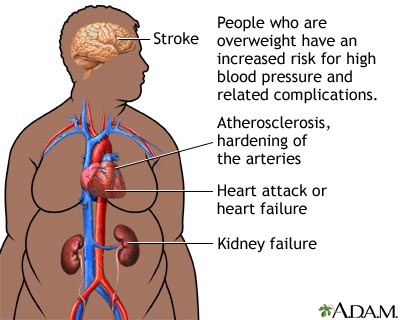Health Library
Health risks of obesity
Images


I Would Like to Learn About:
Description
Obesity means weighing more than what is healthy for a given height. Obesity is a serious, chronic disease. It can lead to other health problems, including diabetes, heart disease, and some cancers.
People with obesity have a higher chance of developing these health problems:
- High blood glucose (sugar) or diabetes.
- High blood pressure (hypertension).
- High blood cholesterol and triglycerides (dyslipidemia, or high blood fats).
- Heart attacks due to coronary heart disease, heart failure, and stroke.
- Bone and joint problems. More weight puts pressure on the bones and joints. This can lead to osteoarthritis, a disease that causes joint pain and stiffness.
- Sleep apnea or breathing pauses during sleep. This can cause daytime fatigue or sleepiness, poor attention, and problems at work.
- Gallstones and liver problems.
- Some cancers.
Three things can be used to determine if a person's weight gives them a higher chance of developing obesity-related diseases:
- Body mass index (BMI)
- Waist size
- Other risk factors the person has (a risk factor is anything that increases your chance of getting a disease)
Body Mass Index
Experts often rely on BMI to determine if a person is overweight. The BMI estimates your level of body fat based on your height and weight.
Starting at 25.0, the higher your BMI, the greater is your risk of developing obesity-related health problems. These ranges of BMI are used to describe levels of risk:
- Overweight (not obese), if BMI is 25.0 to 29.9
- Class 1 (low-risk) obesity, if BMI is 30.0 to 34.9
- Class 2 (moderate-risk) obesity, if BMI is 35.0 to 39.9
- Class 3 (high-risk) obesity, if BMI is equal to or greater than 40.0
There are many websites with calculators that give your BMI when you enter your weight and height.
Waist Size
Women with a waist size greater than 35 inches (89 centimeters) and men with a waist size greater than 40 inches (102 centimeters) have an increased risk for heart disease and type 2 diabetes. People with "apple-shaped" bodies (waist is bigger than the hips) also have an increased risk for these conditions.
Risk Factors
Having a risk factor for a disease doesn't mean that you will get the disease. But it does increase the chance that you will. Some risk factors, like age, race, or family history can't be changed.
The more risk factors you have, the more likely it is that you will develop the disease or health problem.
Your risk of developing health problems such as heart disease, stroke, and kidney problems increases if you have obesity and have these risk factors:
- High blood pressure (hypertension)
- High blood cholesterol or triglycerides
- High blood glucose (sugar), a sign of diabetes
These other risk factors for heart disease and stroke are not caused by obesity:
- Having a family member under the age of 50 with heart disease
- Being physically inactive or having a sedentary lifestyle
- Smoking or using tobacco products of any kind
Summing it up
You can control many of these risk factors by changing your lifestyle. If you have obesity, your health care provider can help you begin a weight-loss program. A starting goal of losing 5% to 10% of your current weight will significantly reduce your risk of developing obesity-related diseases.
References
Jensen MD. Obesity. In: Goldman L, Schafer AI, eds. Goldman-Cecil Medicine. 26th ed. Philadelphia, PA: Elsevier; 2020:chap 207.
Ramu A, Neild P. Diet and nutrition. In: Naish J, Syndercombe Court D, eds. Medical Sciences. 3rd ed. Philadelphia, PA: Elsevier; 2019:chap 16.
Spratt SE, Woodmansee WW. Endocrinology. In: Harward MP, ed. Medical Secrets. 6th ed. Philadelphia, PA: Elsevier; 2019:chap 16.
BACK TO TOPReview Date: 4/17/2021
Reviewed By: David C. Dugdale, III, MD, Professor of Medicine, Division of General Medicine, Department of Medicine, University of Washington School of Medicine, Seattle, WA. Also reviewed by David Zieve, MD, MHA, Medical Director, Brenda Conaway, Editorial Director, and the A.D.A.M. Editorial team. Editorial update 05/23/2022.
 | A.D.A.M., Inc. is accredited by URAC, for Health Content Provider (www.urac.org). URAC's accreditation program is an independent audit to verify that A.D.A.M. follows rigorous standards of quality and accountability. A.D.A.M. is among the first to achieve this important distinction for online health information and services. Learn more about A.D.A.M.'s editorial policy, editorial process and privacy policy. A.D.A.M. is also a founding member of Hi-Ethics. This site complies with the HONcode standard for trustworthy health information: verify here. |
The information provided herein should not be used during any medical emergency or for the diagnosis or treatment of any medical condition. A licensed medical professional should be consulted for diagnosis and treatment of any and all medical conditions. Links to other sites are provided for information only -- they do not constitute endorsements of those other sites. © 1997- 2022 A.D.A.M., a business unit of Ebix, Inc. Any duplication or distribution of the information contained herein is strictly prohibited.
